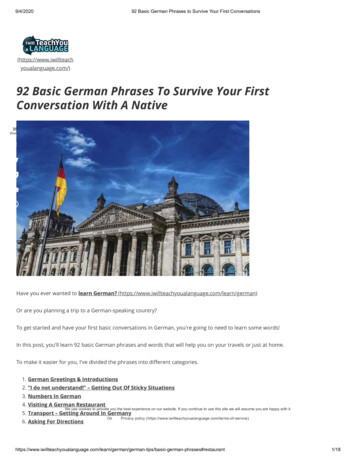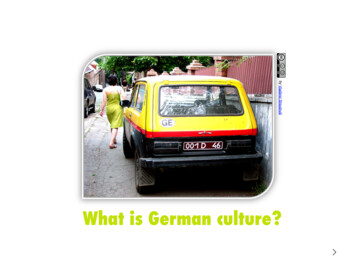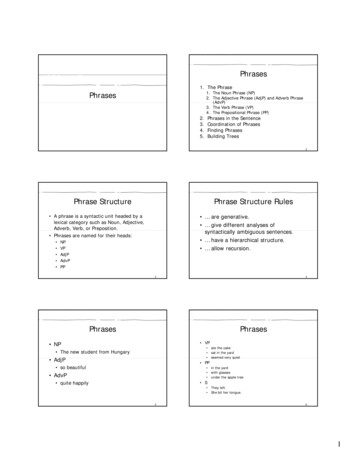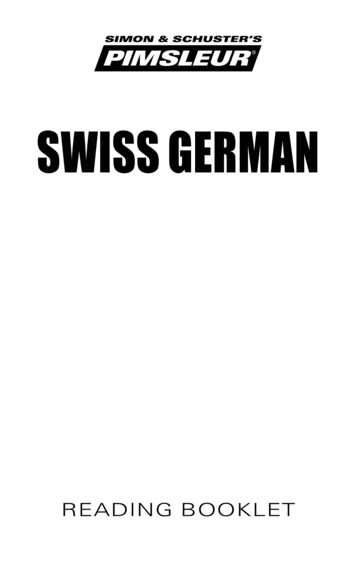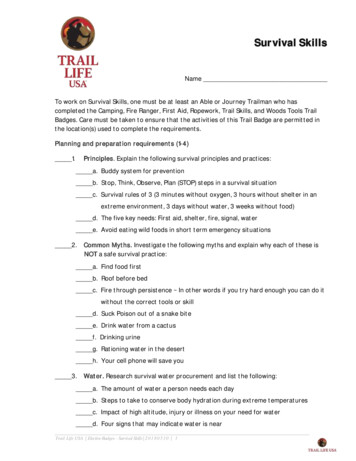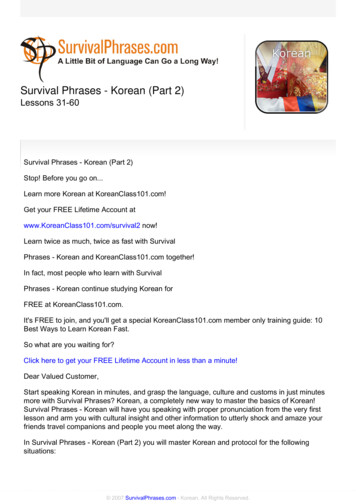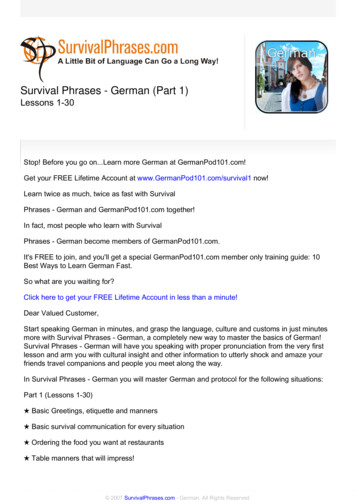
Transcription
Survival Phrases - German (Part 1)Lessons 1-30Stop! Before you go on.Learn more German at GermanPod101.com!Get your FREE Lifetime Account at www.GermanPod101.com/survival1 now!Learn twice as much, twice as fast with SurvivalPhrases - German and GermanPod101.com together!In fact, most people who learn with SurvivalPhrases - German become members of GermanPod101.com.It's FREE to join, and you'll get a special GermanPod101.com member only training guide: 10Best Ways to Learn German Fast.So what are you waiting for?Click here to get your FREE Lifetime Account in less than a minute!Dear Valued Customer,Start speaking German in minutes, and grasp the language, culture and customs in just minutesmore with Survival Phrases - German, a completely new way to master the basics of German!Survival Phrases - German will have you speaking with proper pronunciation from the very firstlesson and arm you with cultural insight and other information to utterly shock and amaze yourfriends travel companions and people you meet along the way.In Survival Phrases - German you will master German and protocol for the following situations:Part 1 (Lessons 1-30) Basic Greetings, etiquette and manners Basic survival communication for every situation Ordering the food you want at restaurants Table manners that will impress! 2007 SurvivalPhrases.com - German. All Rights Reserved.
Basic Counting Internet Cafe, not as easy as you think! Finding your way in the local market and SHOPPING Money exchange and tips on money usage Taking the subway, long distance trains, and buses with confidenceBe sure to read the lesson notes for additional tips and information that will make learning basicGerman and German culture even easier.Best regards,Survival Phrases - GermanP.S. Don't miss your opportunity to get something for nothing!Go to GermanPod101.com/survival1 and sign up for yourFREE lifetime account and learn even more German.P.P.S. Continue on with Survival Phrases - German (Part 2) Lessons 31-60 also available forpurchase.In Part 2 the following are just a few of the topics you'll master: Taking a taxi without being taken advantage of Getting around and asking directions and actually understanding the answer! Learning German using German, and making lots of friends in the process Making the most of a hotel stay, and exploring alternatives to the beaten path Visiting the Post office and mailing thing home Phone rentals and phone cards, don't travel without one! Critical phrases for vegetarians and allergy suffers! Talking to the doctor and explaining symptoms correctly Getting the right medicine Expressing yourself with adjectives and being understood Home visits and proper protocol that will "wow" hosts Getting help, this may be the most useful phrase you ever learn 2007 SurvivalPhrases.com - German. All Rights Reserved.
Lesson 1: Thank You!Danke schönLESSON NOTESIn Germany manners and etiquette are very important. "Please," "Thank You," and "You'reWelcome" are parts of everyday interactions and should be used often. In most cases a simpledanke will suffice however just like in English there are many ways to say thank you.In Germany "Thank you." is danke schön. The first word of the phrase danke means thanks. Thisis followed by schön, which in German is "beautiful".Now in German there are other ways to express one’s gratitude. There are more formal andmore casual ways to do this. Let’s take a look at the casual way.In German the casual way of expressing gratitude, the equivalent of “Thanks” is danke. Thisphrase is used among friends, in other casual situations, continue on with more examples ifpossible.On the other hand, for very special occasions when someone goes above and beyond the call ofbeing kind, when someone is extremely generous, or for any other time you're extremely grateful,we have the following phrases to express extreme gratitude:The first one is vielen Dank or "many thanks". The first word vielen means "many" in English.Next is herzlichen Dank, or "heart felt thanks" in English.In a formal situation it is important to address people in the formal Sie and Ihnen forms. Thisis especially important if you don't know the person, in business settings, or any case whenmore distance is required. A good example would be meeting a professor, an employer, or in abusiness meeting.In these situations a simple danke is by no means rude, however using the formal Ich dankeIhnen is more common and more appropriate. Now let's go over that one once more. The firstword Ich is German for "I". Then danke, and the last word Ihnen which is the formal form for theEnglish "you". To review the formal form of "thank you" is Ich danke Ihnen.These phrases are important and easy to use everyday. So wherever you go in Germany alwaysremember to say danke. 2007 SurvivalPhrases.com - German. All Rights Reserved.
VOCABULARYGermandanke schöndanke, DankherzlichenichIhnenRomanizeddanke schoendanke, DankherzlichenichIhnenEnglishThank you, cheersThanksHearty, heart feltIyou (formal)QUICK TIPIt’s always a good thing to say danke or danke schön after any helpful interaction. In formalsituations because of the formal pronouns Sie and Ihnen the best way to say thank you isich danke Ihnen. You can use this form anytime you are not familiar with the person you arethanking.QUICK TIP 2The German language has a set of vowels that we don’t have in English. These vowels aretopped with two points above the letter called an Umlaut. We see this in the vowel ö in schön.You may be familiar with the song Danke Schön by Wayne Newton where the word schön ismispronounced “shane” in order to rhyme with pain. The correct way to pronounce this vowel iswith your lips slightly more closed like you’re about to whistle. The closest sound in English wouldbe the word “earn”. 2007 SurvivalPhrases.com - German. All Rights Reserved.
Lesson 2: You're WelcomeBitte schönLESSON NOTESJust like "Thank You" and "You're Welcome" go together in English, the same goes in German.Anytime some one tells you danke, or danke schön in any form, bitte or bitte schön is alsoexpected.In German "You're welcome." is bitte schön. The first word bitte means both "please" and "you'rewelcome". This is followed by schön, which in German is "beautiful". So to recap here, we havebitte schön. Literally this means "beautiful request".Another way of responding to a phrase of gratitude is gern geschehen which means "withpleasure". The first word gern means "With pleasure", or "gladly". It is followed by geschehen,which in German is "to happen", or "to occur". So to recap here, we have gern geschehen.Literally this means "Done with pleasure".VOCABULARYGermanbitte schöngerngeschehengern geschehenRomanizedbitte schoengerngeschehengern geschehenEnglishyou're welcome, here you aregladlyto happen, to occurwith pleasureQUICK TIPWith bitte and bitte schön there is no formal or informal use. Bitte is the short way to say "you'rewelcome". The Germans use bitte for "please", it's all a matter of context.QUICK TIP 2You can also use bitte schön when you are giving someone something. For example; you areasked to pass the butter, as you hand the butter to the person you can say bitte schön, which inthis case means "here you are". 2007 SurvivalPhrases.com - German. All Rights Reserved.
Lesson 3: Please (This Please)BitteLESSON NOTESIn English, please is arguably the most important word you can know and even more so inGermany. A little "bitte" can go a long way. It is one of the more useful words in the Germanlanguage. It means, please, here you are, and you're tediesesdasEnglishpleasethisthatQUICK TIPTo avoid misunderstandings you should always use "bitte" whenever you ask for something,otherwise you might sound like you are just giving orders.QUICK TIP 2"Bitte" is a word that expresses politeness, friendliness, and attention, And should be used forevery request of help, support and service. 2007 SurvivalPhrases.com - German. All Rights Reserved.
Lesson 4: Basic GreetingshalloLESSON NOTESIn Germany there are four main greetings. Hallo, is the most general greeting and can be usedanytime. There are also different greetings for different times of the day. “Guten Morgen” or“Morgen” is the greeting used before noon. “Guten Tag” or simply “Tag”, is the afternoon greetingbut can be used throughout the day. After about six o’clock you can use the evening greeting,“guten Abend” or “Abend”.“Hallo”, just like its English counterpart, can be used anytime of the day and in any circumstance.Like any greeting, it is customary that when one is greeted, one returns the greeting. So, ifsomeone says “Hallo” to you in Germany, you would say “hallo” or any of the other threegreetings we’ve learned today.With “guten Morgen”, “guten Tag” and “guten Abend” the “guten” is often dropped, leaving just“Morgen”, “Tag” and “Abend”. The most universal of these greetings is by far “guten Tag”. This isa fairly general greeting meaning “Good day”, and you will hear it throughout the day.PHRASESGermanguten Morgenguten Tagguten AbendRomanizedguten Morgenguten Tagguten AbendEnglishgood morninggood daygood (m)Gott(m) 2007 SurvivalPhrases.com - German. All Rights Reserved.
QUICK TIPIn some parts of Germany they use different greetings. In Bavaria a very common greetingis “Grüß Gott”, which means “greet god" (The symbol in the word “Grüß” is a double s and ispronounced like a long s) . If you're not sure how to greet someone a simple “hallo” will never failyou.QUICK TIP 2In German all nouns are capitalized. You can see here as well as in the vocabulary lists how theyare written. Also, unlike English with it’s single article “the”, German has three definite articles:der (masculine), die (feminine), and das (neutral). You will see that these sometimes changedepending on the gender of the noun, whether it is singular or plural and it’s case (nominative,genitive, dative and accusative). The vocabulary lists will always note the gender of each nounwith the first letter of the gender: (m) masculine, (f) feminine, and (n) neutral. 2007 SurvivalPhrases.com - German. All Rights Reserved.
Lesson 5: Parting Greetings (Goodbye)tschüß tschuessLESSON NOTESToday we'll introduce parting greetings.A parting expression that can be used for all occasions is "tschüß" which means "bye".Another parting expression is "auf Wiedersehen". This phrase can be used on all occasions. Thefirst word "auf" means upon. It is followed by "Wiedersehen". "Wieder" in English is "again".When parting or saying goodbye at night there is the greeting "gute Nacht".Let's take a look at the components. The first word "gute" means "good". This is followed by"Nacht", which in English is "night".In German the way of saying goodbye on the phone is "auf Wiederhören". We’ve already workedon auf, which means "upon" in English. "Hören" is the German word for hear. "auf Wiederhören""in English literally means "hear you later".In German a more casual way of saying goodbye is "bis später". "Bis" means "until" in German.And "später" is "later". When you say "bis später" you are literally saying "until onagainseegood bye(telephone-formal)heargoodnightuntillater 2007 SurvivalPhrases.com - German. All Rights Reserved.
QUICK TIPIn Bavaria (or "Bayern" in German) the word “tschüß” is rarely used. Instead, when Bavarianssay good bye to each other they goodbye they use “ciao” or “servus”. These partings are alsoused often in Switzerland and Austria. 2007 SurvivalPhrases.com - German. All Rights Reserved.
Lesson 6: Where is the Bathroom?Wo ist die Toilette?LESSON NOTES“Wo ist die Toilette?” and “Darf ich die Toilette benutzen?”, may be the most important Germanphrases you can learn. In German "Where is the bathroom" is "Wo ist die Toilette".Let's take a look at the components. The first word "Wo" means "where". This is followed by "ist",which in English is "is". So to recap here, we have "Wo ist". Literally this means "where is".The next word is "die" which means "the". The last word is "Toilette", which in " English is ""toilet".So all together we have "Wo ist die Toilette". Literally this means "where is the toilette".If you can't find a public toilet, you may find your self having to ask in a bar or cafe if you can usethe theirs. The most polite way to ask this is, "Darf ich die Toilette benutzen?".The first word, "darf" is the German equivalent of "may". Then comes "ich" which means "I" inGerman. So far, we have "darf ich" which is German for "may I". The next work is 'die' whichmeans "the". The last word is "Toilette", which in English is " "toilet". So far that makes "Darf ichdie toilette". Finally we have "benutzen" which is German for "use"."Darf ich die Toilette benutzen?" "May I use the toilet?"When you finally get to the bathroom there may be one last hurdle. In some instances, only theGerman is written on the doors! Don't forget: the word "men" is "Mann" ", or "Herr". The word forwomen is "Frau" ", or "Dame".PHRASESGermanWo ist die Toilette?Darf ich die Toilettebenutzen?RomanizedWo ist die Toilette?Darf ich die Toilettebenutzen?EnglishWhere is the bathroom?May I use the toilet? 2007 SurvivalPhrases.com - German. All Rights Reserved.
QUICK TIPIn Germany you will have to pay to use some public bathrooms . Prices range from 50 cents to1 Euro, and some restrooms are free. If you see a table in front of the entrance to a public toilet,you will have to pay to use the facilities. 2007 SurvivalPhrases.com - German. All Rights Reserved.
Lesson 7: Can You Speak English?Sprechen Sie Englisch?LESSON NOTESIn today's lesson we'll cover another extremely important phrase, "Can you speak English?"Using this phrase as opposed to speaking English at someone is important for many reasons.For one if the party you’re speaking to doesn’t understand English, at least they’ll be able tounderstand what you’re asking. Furthermore, it shows a lot respect to show that you took theeffort to learn even a little bit of the language, and for these reasons and many more, we’re goingto cover this phrase.In German, "Can you speak English?", is Sprechen Sie Englisch?. The first word sprechenmeans "speak". This is followed by Sie, which in English is you. Let's take a look at the next wordEnglisch which means "English".So all together we have Sprechen Sie Englisch?. Literally this means "Speak you English?".Now let's try a different language. How about French. Sprechen Sie Französisch? "Can youspeak French?". The word for "French" is Französisch. Here just the word for the languagechanges. The rest is the same.Nowadays in Germany English is studied at schools, so the number of speakers is increasing;however, there are still many people who don’t speak English. France shares a long border withGermany so many Germans will speak French fluently.PHRASESGermanSprechen Sie Englisch?Sprechen Sie Französisch?RomanizedSprechen Sie Englisch?Sprechen Sie Franzoesisch?EnglishDo you speak English?Do you speak French?QUICK TIPGermans appreciate any attempt to speak their language. So it’s always good to use as muchGerman as you can.In restaurants it can be difficult to order when you don’t understand what is on the menu. Don’thesitate to ask the waiter/waitress if they have an English menu. 2007 SurvivalPhrases.com - German. All Rights Reserved.
Lesson 8: I Don't UnderstandIch verstehe nicht.LESSON NOTES“I don’t understand” is going to be a very useful phrase for a German language learner. Whilethere are similarities between English and German, German sounds very different from English.In German “I don’t understand” is "Ich verstehe nicht". The first word "Ich" means "I". It isfollowed by "verstehe", which in English is "understand". Put the two together and we have "Iunderstand" or "Ich verstehe". The last word "nicht" means "not".So all together we have "Ich verstehe nicht". Literally this means "I understand not", or "I don'tunderstand".PHRASESGermanIch verstehe nicht.RomanizedIch verstehe nicht.EnglishI don't understand.QUICK TIPRemember, any effort you make to understand will help you learn. In confusing situations, ifsomeone is speaking too fast, or you don’t understand their dialect, you can always use “Ichverstehe nicht”. This way you show you are interested in understanding and using the language. 2007 SurvivalPhrases.com - German. All Rights Reserved.
Lesson 9: Can You Say It Again?Können Sie das wiederholen?LESSON NOTESIn this lesson you’ll learn two very important tools which will help you greatly in your goal to learnGerman. The two phrases, "can you repeat that", (“Können Sie das wiederholen?”) and "slowlyplease", (“Langsam bitte”) will help you learn from those around you. Using these phrases willhelp you in developing a higher sensitivity to the sound of the language.In German “can you say it again?” is "Können Sie das wiederholen?". The first word "können"means "could". It is followed by "Sie", which in English is "you". So to recap here, we have"können Sie". Literally this means "Could you". The next word is "das" which is "this". It isfollowed by "wiederholen", which in "English"is "repeat".So all together we have "Können Sie das wiederholen?". Literally this means "Can you thatrepeat?".Here’s another phrase you can use in much the same way.In German “Once again please.” is "Noch einmal, bitte". The first word "noch" means "still". It isfollowed by "einmal", which in German is "once more". So to recap here, we have "noch einmal".Literally this means "still once more". The last word "bitte" means "please". So all together wehave " Noch einmal, bitte ". Literally this means "Still once more, please"."Slowly please.” is "langsam bitte". The first word "langsam" means "slow". It is followed by"bitte", which in English is "please". The entire phrase is "Langsam bitte". Literally this means"slow please".PHRASESGermanKönnen Sie das wiederholen?Noch einmal, bitteLangsam, bitteKönnen Sie langsamsprechen, bitte?RomanizedKoennen Sie daswiederholen?Noch einmal, bitteLangsam, bitteKoennen Sie langsamsprechen, bitte?EnglishCan you repeat that?Once again, pleaseSlowly, pleaseCan you speak slowly,please? 2007 SurvivalPhrases.com - German. All Rights Reserved.
QUICK TIPIn the phrase “Langsam, bitte” we heard the German word for "please". You can add this to everyquestion. With the phrase, “Können Sie das wiederholen?” simply add bitte after the last wordlike this; “Können Sie das wiederholen, bitte?”QUICK TIP 2We’ve learned how to ask if some can speak English in an earlier lesson. Let’s replace the word“Englisch” and make a new sentence: “Können Sie langsam sprechen, bitte?” in English, “Canyou speak slowly, please?” 2007 SurvivalPhrases.com - German. All Rights Reserved.
Lesson 10: Apologies(I'm Sorry)VerzeihungLESSON NOTESIn today's lesson we will be covering ways of making apologies. The most common phrases forexcusing oneself are "Entschuldigung” and “Verzeihung”. We will also be covering a sincere wayof apologizing, and how to respond if someone apologizes to you."Entschuldigung" can be used when you bump into someone accidentally, or if you needsomeone’s attention."Verzeihung" is used in more as a way of saying “excuse me”. You would use this if someone isblocking your way, or if you have to interrupt a stranger to ask for directions.Finally there’s the German equivalent of "I’m sorry", "Es tut mir Leid", or literally "it does meharm".What if someone says one of these expressions to you? The proper response is "Kein Problem"which is literally "None problem".PHRASESGermanEs tut mir LeidKein ProblemRomanizedEs tut mir LeidKein ProblemEnglishI am sorryNo hsorry/excuse mesorry/excuse f)Leid(n)QUICK TIPA German speaker is walking down the street and as he goes around a corner, he walks straightinto someone! His immediate response is "Entschuldigung". 2007 SurvivalPhrases.com - German. All Rights Reserved.
A student in a Berlin university can't hear what the lecturer is saying, and asks, "Entschuldigung,ich verstehe nicht, können Sie das wiederholen?".A tourist in enters a cafe in Frankfurt and needs to find a bathroom. You say, "Verzeihung, darfich die Toilette benutzen?"QUICK TIP 2“Verzeihung” and “Entschuldigung” are also very important if you are late. In Germanypunctuality is very important. It’s considered very rude to be late, so if you aren't going to beon time, it is important that you call and notify the other party. Be sure to use “Verzeihung” or“Entschuldigung”! 2007 SurvivalPhrases.com - German. All Rights Reserved.
Lesson 11: How Many People?Wie viele Personen sind in ihrer Gruppe?LESSON NOTESThere is a wide variety of German food, and your job as a visitor is to eat as much of as manythings as possible! However, before you start eating you have to get the table! So in today’slesson we'll cover getting to the table in restaurant. As for ordering.well, you'll just have to hangon until next week.Now usually the first question you'll be asked is "How many people are in your party?" whichin German is "Wie viele Personen sind in ihrer Gruppe?". The first word "wie" means "how?".This is followed by "viele", which in English is "many". This is followed by "Personen" , which inEnglish is "people". The next word "sind" means "are". The next word is "in" , which in English is"in". The next word is "ihrer", which in English is "your". Finally the last word of the sentence is"Gruppe", which in English is "group". So all together we have "Wie viele Personen sind in ihrerGruppe?". Literally this means "How many people are in your group?".Now let's go over how to answer.In German the word for "one" is "eins". "Two" is "zwei". "Three" is "drei". "Four" is "vier". Finaly"five" is "fünf".And now let's put them together with the word for "people" which is "Person" singular and"Personen" plural. Because the word "Person" is a feminine noun ("die Person") the word for"one", "eins" becomes "eine". "Eine Person". We can take the rest of the numbers as theyare. Now we need to use the plural form "Personen", so, "zwei Personen, drei Personen, vierPersonen", and "fünf Personen".Now Let’s make a complete sentence. In German, the word for "we" is "wir". Next comes theGerman word for "are", which is "sind". So all together we have "Wir sind" which is "we are" inEnglish.Now we can put it all together. Let’s give the answer for two people. "Wir sind zwei Personen".Now for three, "Wir sind drei Personen", Four people, "Wir sind vier Personen "and five people,"Wir sind fünf Personen".Now let’s look at what you would say if you come alone. We have already learned the Germanword for "I" which is ich. Let’s learn the word for "am" which is bin. So, now we have "Ich bin", "Iam" in English. Now we can answer for one person. "Ich bin eine Person." 2007 SurvivalPhrases.com - German. All Rights Reserved.
PHRASESGermanIch bin eine Person.Wir sind Personen.RomanizedIch bin eine Person.Wir sind Personen.EnglishI am one person.We are ermanPersonenPersonfünfvierdreizweieinsQUICK TIPWhen necessary, reservations should be made over the phone. In general, how and where tomake a reservation depends on the type and location of the dinner. For business dinners, areservation is required. For casual dinners with friends, usually no reservation is required.It is always helpful to make some research before making a reservation for a whole group. Thisway you can have important information regarding the menu, smoking or non-smoking, pricerange and design. 2007 SurvivalPhrases.com - German. All Rights Reserved.
Lesson 12: Restaurant 1NichtraucherLESSON NOTESToday we'll cover getting a table in the section of the restaurant you want. . In Germany smokingin restaurants is still accepted, but there are occasions when you can ask for a non-smokingseat. Or, perhaps you would like a smoking seat. Either way let's cover that first.Now remember when you enter a restaurant you'll hear "Wie viele Leute sind in ihrer Gruppe?".This will likely be followed by one of the following."Non-smoking" in German is "Nichtraucher". This word consists of two words, "nicht" and"Raucher". The first word "nicht" means "non". It is followed by "Raucher", which in German is"smoker"."Smoking" is "Raucher".Now you can beat them to the punch by saying how many people in your party and non-smokingfirst. Let’s try it with a group of three people."Wir sind drei Personen und Nichtraucher" which means in English "We are three people andnon-smokers" The only added word we have here is und which means "and". Now remember,you can plug in any number more that one in here. For just one person you can use "Ich binNichtraucher" which means in English "I am a non-smoker".PHRASESGermanIch bin Nichtraucher.Wir sind drei Personen undNichtraucher.RomanizedIch bin Nichtraucher.Wir sind drei Personen undNichtraucher.EnglishI am a non-smoker.We are three people r 2007 SurvivalPhrases.com - German. All Rights Reserved.
QUICK TIPSmoking while eating is generally considered rude, so it is always god to wait until everyone isfinished eating before lighting up.It’s also considered very rude to walk through a restaurant with a lit cigarette. 2007 SurvivalPhrases.com - German. All Rights Reserved.
Lesson 13: Restaurant 2Können wir bestellen?LESSON NOTESToday we'll cover getting by at the table. First you may have to get a hold of the staff. You canaccomplish this by saying:"Können wir bestellen?" which means "Can we order?". The first word "können" means "can".The next word "wir" means "we" in English. The last word is German for "order". "Bestellen".Once at the waiter or waitress comes to your table, you can go with the standard point and "Thisplease."In German "This please." is "dieses bitte". The first word "dieses" means "this". This is followedby "bitte", which in English is "please".Now if you're feeling ambitious, you could go for "What do you recommend?"In German "What do you recommend?" is "Was empfehlen Sie?" The first word was means"what". This is followed by "empfehlen", which in English is "recommend". Finally, this is followedby "Sie" which in English means "you". So all together we have "Was empfehlen Sie?".One more very important word is the word for “menu”. In German, "menu" is "Speisekarte". Theword "Menu" in German actually means a set meal with at least 3 courses. So asking for the“Menu” might bring you more than you bargained for.PHRASESGermanWas empfehlen Sie?Dieses bitte.Können wir bestellen?RomanizedWas empfehlen Sie?Dieses bitte.Koennen wir bestellen?EnglishWhat do you recommend?This please.Can we order?RomanizedVerzeihung.SpeisekarteEnglishExcuse me.menuVOCABULARYGermanVerzeihung.Speisekarte 2007 SurvivalPhrases.com - German. All Rights Reserved.
QUICK TIPWe’re at the table and ordering in this lesson. One thing to remember when ordering is to neverforget to add, "Verzeihung and bitte". Let’s try that with the first phrase in this lesson. "Können wirbestellen?" easily becomes, "Verzeihung, können wir bestellen bitte?" and is much more polite.QUICK TIP 2In Germany it is considered rude for the waiter to hover around the table. So after you havedecided what you want to order and you want to get the attention on the waiter, often all youhave to do is close the menu and set it aside. This shows that you are ready to order. If thisdoesn’t work usually eye contact and a "Verzeihung, können wir bestellen bitte" will. 2007 SurvivalPhrases.com - German. All Rights Reserved.
Lesson 14: Restaurant 3Hat es geschmeckt?LESSON NOTESToday we'll cover getting out of the restaurant. First you may have to get a hold of the staff.Again you can accomplish this by saying "Verzeihung" .Once at your table, your waiter will ask you, "Did you like it?"or "Hat es geschmeckt?" Literallythis means "Did it taste?" The first word "hat" means "did". Next we have "es". The last word"geschmeckt" literally means "taste".If you want to show your appreciation you can say: "Es schmeckt köstlich". The first word is "es",which in English is "it". The second word is "schmeckt" which in English is "tastes". The last word"köstlich" means "delicious" in English. So all together we have "Es schmeckt köstlich".Now you can ask for the check.In German "Check please." is "Die Rechnung, bitte". The first word "die Rechnung" means "thecheck". It is followed by "bitte", which in English is "please".PHRASESGermanHat es geschmeckt?Es schmeckt köstlichdie Rechnung, bitteRomanizedHat es geschmeckt?Es schmeckt koestlichdie Rechnung, bitteEnglishDid you like it?It tasted deliciousThe check, please.QUICK TIPIn Germany tips are not expected. However, if you were content with the service a 5 to 10percent tip is appropriate.Do not leave the tip on the table, if you’re paying cash and your bill is for 29 Euros, and you paywith 40 Euros, tell the waiter, the total amount including tip. A 10% tip would then be 32 euros.You would say, “32 bitte”. 2007 SurvivalPhrases.com - German. All Rights Reserved.
Lesson 15: Counting 1-10Eins, Zwei, DreiLESSON NOTESThis lesson is very straightforward, as we're going to cover counting zero through ten.Let's jump right in. 1 - eins 2 - zwei 3 - drei 4 - vier 5 - Fünf 6 - sechs 7 sieben 8 - acht 9 neun 10- zehn 0 - nullCounting things in German is ve
Survival Phrases - German will have you speaking with proper pronunciation from the very first lesson and arm you with cultural insight and other information to utterly shock and amaze your friends travel companions and people you meet along the way. In Survival Phrases - German you will master Germ
